七年级英语人教版下册Unit3_单元同步梳理课件
人教版七年级英语下册第三单元课件
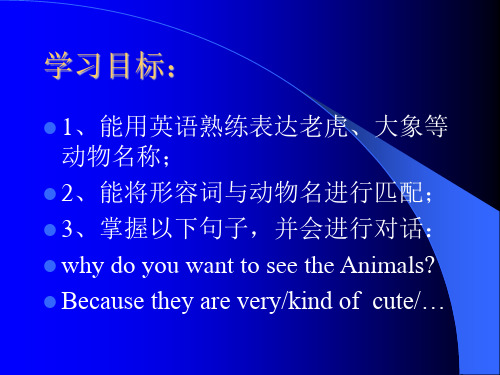
lion
penguin
giraffe
monkey
Which animal do you want to see first in the zoo?
I want to see the pandas/… first.
Why do you want to sI like them.
A lion
4 . This animal lives only in China . It is black and white . ______
A panda
Guess :which animal is it ?
6. This animal is very tall . It has a very long neck . _______
唱 出 来
Guess :which animal is it ?
1. This animal likes to eat bananas . ________
A monkey
2.This animal is the largest animal on land .(陆地上) _______
An elephant
3 . This animal is from Africa(非洲) . It eats meat . It usually sleeps and relax 20 hours a day . _______
1b
√
√
√
2a
Listen and write the animals you hear. Draw a line from the animals to the description words.
Animals Description words 1.________ a. interesting b. cute 2._______ c. fun d. smart
人教版英语七年级下册Unit 3 Section B(2a-2d)新版课件
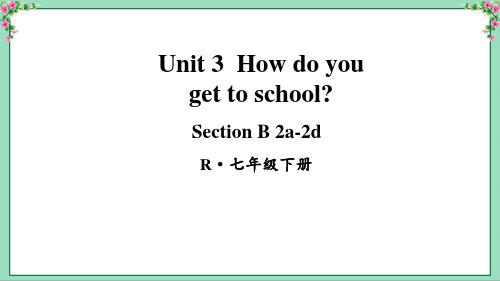
Tips: First understand the questions, then find the answers in the text.
Read Para. 2 & Para. 3 and fill in the blanks.
to understand the general idea of the passage.
Look at the layout(布局)of the story and answer.
➢Where can you see the story? A. In a newspaper. B. In a magazine. C. In a book.
Careful-reading
Read Para. 1 and judge the sentences “T” or “F”.
T 1. For many students, it’s not hard to get to school. F 2. For the students in one small village in China, it’s
Tips: Sometimes, we can judge the type of article by its layout.
Fast-reading
Read the news story from some years 2b ago and choose the best title for it.
Learn to guess the main idea of the passage and talk about how to get to places.
Unit3SectionA2d3c课件人教版七年级英语下册

3a Read the story and answer the questions.
1.Why was Nancy’s mom angry with her?
Because Nancy didn’t want to take the dog for a walk.
2. Did they solve the problem? How?
7:00 - 7:25
6:40 - 7:25
How do you get to school? I …
How long does it take?
It takes …
How farΒιβλιοθήκη is it?It’s about …
拓展 how引导特殊疑问句的其他常见用法如下:
询问程度、 你认为北京怎么样? 看法 How do you like Beijing? 今天的天气怎么样?
Unit 3 How do you get to school?
Section A (2d-3c)
Review
Look at the pictures and make up sentences.
I go to _________ by _____. I take ________ to the _____.
How do you get to school? I ride my bike.
How does she get to school? She usually takes the bus.
How long does it take to get to school?
It takes about 15 minutes.
It takes about 15 minutes.
人教版七年级英语下册Unit 3 第三单元教学课件PPT

car
bike
subway
plane tatxrui ck
bus
Brainstorm
plane ship bus train
taxi
transportation
...
subway car bike truck
Discussion: How do you get to school?
Talk about how to get to places. Improve your listening skills through listening training.
Let’s watch a video
交通工具 What transportation is mentioned in the video?
tataktrakeikedtwehethtaeahleskebutirbkauweisnay
Pre-listening: Look at the picture and predict
Can you predict how Bob goes to school?
And how about Mary, John, Paul, Yang Lan and Jim?
1b Listen and write the numbers next to the
correct students in the picture above.
1. Bob
2. Mary
3. John
2
4. Paul
6 45
3
5. Yang Lan
6. Jim
Listen again and fill in the blanks.
Unit3Section+A+2e-3c++课件2023-2024学年人教版七年级英语下册
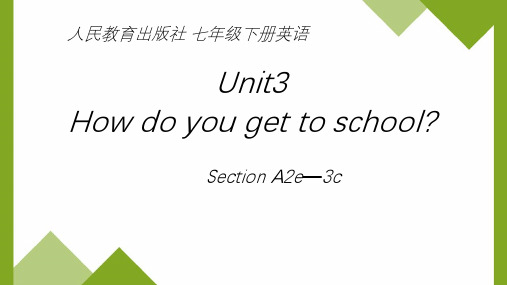
Unit3 How do you get to school?
Section A2e—3c
How does he go to work?
He takes the bus to work. = He goesto work by bus. = He goesto work on a bu.s
How does he get to school?
Hschool
o.n foot
How does she get home?
She takes a carto get home.
=She gets home =She gets home
by .car in a. car
How long does it take? It takes 25 minutes.
How long
25 minutes
2e Role-play the conversation.
1. Who usually takes the bus to school?
Lisa.
2. How does Jane get to school? She rides her new bike to school.
Who Liu Xing
How bus
How far
about 14 kilometers
How does Liu Xing get to school? He takes the bus to school. How far is it from his home to school?
It’s about 14 kilometers.
Then answer the questions.
人教版七年级下册英语第三单元课件 .ppt
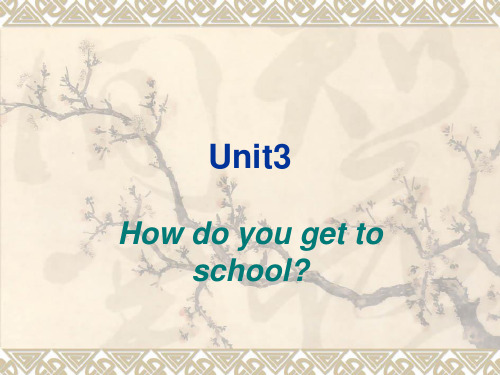
How do they go to school? ❖They walk to school.
They go to school on foot.
How do they go to school?
❖ They go to school by boat. ❖ They take the boat to school. ❖ They go to school in a boat.
❖ 公共汽车:take the bus to …=go to…by bus =go to …on a bus
❖ 自行车:ride (a bike) to…=go to …by bike=go to …on a bike
❖ 飞机:take the plane to…=go to …by plane =go to…in a plane
5. afraid 害怕;恐惧 ; 形容词 (1)be afraid …… 害怕的 The girl is very afraid. 小女孩很害怕。 (2)be afraid of … 害怕 ……
My sister is afraid of snakes. 我妹妹害怕蛇。
❖be afraid to do sth 害怕做某事 ❖be afraid of doing sth ❖例句:I am afraid to walk in the
○ A
B takes/ drives C
2.Sally’s father by a car to work.
○ A
B C takes
3.They go to the farm by thteakiers bikes.
○ A
C
on
B
by
4.His friends went to Shanghai on plane.
人教版七年级英语下册Unit3-How-do-you-go-to-school?全单元课件(共96张PPT)
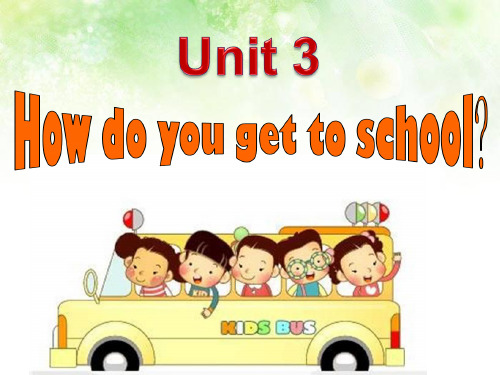
walk to +地点=go to +地点 +on foot
get to 的用法: 1、到达学校 get to school 到达北京 get to Beijing
get to 后跟地点名词
2、 到达家 到达这 到达那 get home get here get there
get to 后面如果是地点副词,要去掉to
1. I take the train to school. by train = I get to school __________. 2. She takes the subway to school. (同义句) by _______. subway She _____ gets to school ___
I take the subway.
I take the ship.
I ride the bicycle.
I walk to school.
How do you get to Beijing? I ______ to Beijing. take the train
take the plane take a car
They ride bikes to school. = They get to school by bike.
He walks to school
= He gets to school on foot.
How does he get to work?
bike = bicycle
Yao Ming rides a bike to work every day. = Yao Ming gets to work by bike every day.
Unit 3--4 课件人教新目标七年级英语下册单元基础知识复习

重点短语
根据汉语意思,写出相应的英文短语 1. 坐火车 _ta_k_e__th_e__t_ra_i_n_/b_y__t_ra_i_n_ 2. 坐公交车 _t_a_k_e_t_h_e__b_u_s_/b_y__b_u_s__ 3. 坐地铁 _ta_k_e__th_e__s_u_b_w__a_y_/b_y__s_u_b_w_a_y__ 4. 骑自行车__r_id_e__a_b__ik_e_/_b_y_b_i_k_e__ 5. 每天_____e_v_e_ry__d_a_y____ 6. 到校____g_e_t _to__s_c_h_o_o_l__
5.Lily is ___n_e_w___ (新的)in our class. Let's tell her some of our class rules. 6.There is a lake in the center of the park and we can take a ___b_o_a_t__ (船) there. 7.Some of them take the _s_u_b__w_a_y_ (地铁) to school. 8.My grandpa likes to ___l_iv_e___ (居住) in the village. He doesn't want to move to the city. 9.The old man is 90 __y_e_a_r_s__ (岁) old, but he can walk well and speak clearly. 10.Don't __l_e_a_v_e__ (离开) the club before four o'clock in the afternoon.
17.开车(v.) ___d_r_iv_e__ →(名词)司机 __d_r_iv_e_r__ 18.横过;越过(v.)___c_ro_s_s__ →(介词)__a_c_r_o_s_s_ 19.离开;留下(v.)___le_a_v_e__ →(过去式)___l_e_f_t __ 20.真的;符合事实的(adj.)___t_ru_e___ →(副词)___t_ru_l_y__ →(名词)___tr_u_t_h__
人教版七年级英语下册Unit3_单元要点梳理总结

Unit3 单元要点梳理总结重点短语1.学校旅行school trip2.去散步go for a walk3.挤牛奶milk a cow4.骑马ride a horse5.喂鸡feed chickens6.与农民交谈talk with a farmer7.照相take photos 8.问一些问题ask some questions9.种苹果grow apples 10.带某人逛/参观某地show sb. around11.学到许多learn a lot 12.摘草莓pick some strawberries13.上周last week 14.在乡村in the countrysidevisit my grandparents 16.去钓鱼go fishing15.拜访我的祖父母17.去爬山climb the mountains 18.参观博物馆visit a museum19. 画画draw pictures 20.去学校旅行go on a school trip21.礼品店gift shop 22.为某人买某物buy sth for sb.23.总得来说all in all 24.对……感兴趣be interested in...25.一点儿也不not...at all重点句型1.你见到奶牛了吗?Did you see any cows?2.我见到了而且见到了很多很多。
Yes, I did. I saw quite a lot.3.卡罗尔拍照片了吗?Did Carol take any photos?4.是的,她拍了。
Yes, she did.5.你好,Eric,上周旅游怎么样?Hi, Eric, How was your trip last week?6.精彩极了,我还去乡下看望了爷爷奶奶。
It was excellent. I visited my grandparents in thecountryside.7.我们玩得非常开心!We had so much fun!8.我也拍了好多精彩照片。
[全]人教版七年级英语下册unit3单词、知识梳理、词汇句型精讲
![[全]人教版七年级英语下册unit3单词、知识梳理、词汇句型精讲](https://img.taocdn.com/s3/m/423f4bb2f5335a8102d220e1.png)
人教版七年级英语下册unit3单词、知识梳理、词汇句型精讲Unit3 How do you get to school?1Unit 3单词(音标)train [tren] n.火车bus [bs] n.公共汽车;公交车subway ['sbwe] n.地铁take the subway 乘地铁ride [rad] v.骑n.旅程bike [ba k] n. 自行车ride a bike 骑自行车sixty ['skst] num.六十seventy ['sevnt] num.七十eighty ['et] num.八十ninety['nant] num.九十hundred ['hndrd] num.一百minute['mnt] n.分钟far [fɑ] adv. & adj. 远;远的kilometer ['kl,mit(r)] n.公里new [nju] adj. 新的;刚出现的every ['evr] adj. 每一;每个every day 每天by [ba] prep. (表示方式)乘(交通工具)by bike 骑自行车drive [drav] v. 开车car [kɑ] n.小汽车;轿车live[lv] v. 居住;生活stop [stɑ:p][stp] n. 车站;v. 停止think of 认为cross [krs] v.横过;越过river ['rv] n.河;江many ['men] adj. & pron.许多village ['vld] n.村庄;村镇between [b'twin] prep.介于…之间between…and…在……和……之间bridge [brd] n.桥boat [bt] n.小船ropeway ['rpwe] n.索道year [j] [ j] n.年;岁afraid ['fred] adj.害怕;惧怕like [lak] prep.像;leave [liv] v.离开dream [drim] n.梦想;睡梦v.做梦true [tru] adj.真的;符合事实的come true实现;成为现实Dave[deiv] 戴夫(男名2 Unit3 知识梳理◆短语归纳1. get to school 到达学校2. take the subway 乘地铁3. ride a bike 骑自行车4. how far 多远5. from home to school 从家到学校6. every day 每天7. take the bus 乘公共汽车8. by bike 骑自行车9. bus stop 公共汽车站10. think of 认为11. between…and…在…和…之间12. one 11-year-old boy 一个11岁的男孩13.play with…和…玩14. come true 实现15. have to 不得不◆用法集萃1. take…to…= go to…by…乘…去…2. How do/does sb get to…? 某人是怎样到…的?3. How far is it from…to…? 从…到…有多远?4. It takes sb. some time to do sth. 做某事花费某人多长时间。
人教版七年级下册英语第三单元知识点梳理

人教版七年级下册英语第三单元知识点梳理Unit 3 How do you go to school一、词汇与短语◆重点单词◆重点句子◆重点单词变形二、语法知识点A部分知识点1.与how构成的词组引导的特殊疑问句❶ how表示爱好、程度、看法等,意为“……怎么样?”。
eg:—How do you like the music?你觉得这首乐曲如何?—I like it very much.我非常喜欢它。
How is your Chinese?你的汉语如何?How do you like China?你认为中国怎么样?❷用于询问身体健康状况,意为“……怎么样?”。
eg:How do you do?你好!How are you?你(身体)好吗?❸ how提问交通方式。
其答语分三种情况:◆take a/the+表示交通工具的名词◆by +表示交通工具的单数名词◆on/in+限定词+表示交通工具的名词eg:How do you go to workevery day? 你每天怎样去上班?I take the subway to work. 我乘地铁去上班。
=I go to work by subway.=I go to work in the subway.❹表示感叹。
eg:How cold it is today!今天好冷啊!How hard they are working!他们在多么辛勤地劳动啊!How fast he runs!他跑得多快啊!❺表示某种方式、手段或方法。
eg:How do you spell it?你怎样拼写它?How did he go to schoolyesterday?他昨天是怎样去上学的?How do you know about it?你怎么知道这件事的?❻ how about用于询问或征询意见等,相当于what about,后接名词、代词或动词的-ing形式,意为“……怎么样?”。
Unit 3 单元知识点课件2022-2023学年人教版七年级英语下册
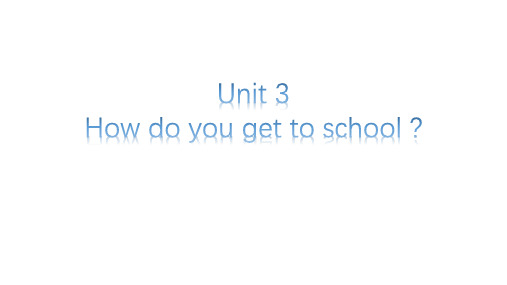
一、根据句意,用恰当的疑问词(组)完成下列小对话。
1.—__H__o_w__l_o_n_g__does it take you to get to your uncle's home?
—About twelve minutes.
2.—__H__o_w__f_a_r__is it from your home to the store?
—He is 16.
It is + adj. (for sb.) to do sth. (对某人来说)干某事是…… 例如:
It is interesting for me to play computer games. 对我来说玩电脑游戏很有趣。
— It’s very important __B_ us to make a plan before a
--- ______ do you play football? --- Once a week.
A. How much B. How long C. How often D. How far
答案:C 解析:本题是对疑问副词词组的考察,通过答句可以 判断出是询问动作发生的频率,所以选择C。
—______ is it from your home to the school?
辨析 cross, across与through
(1)across 介词,与动词连用,动词+across cross=go across
(2)cross 动词,主要表示在物体表面上横穿。如横过马路、 过桥、过河等。例如: Be careful when you cross the street.
(3) through 介词,主要表示从空间内部穿过。如穿过森林、 隧洞等。例如: The two friends were walking through the forest.
人教版七年级英语下册unit3全单元课件
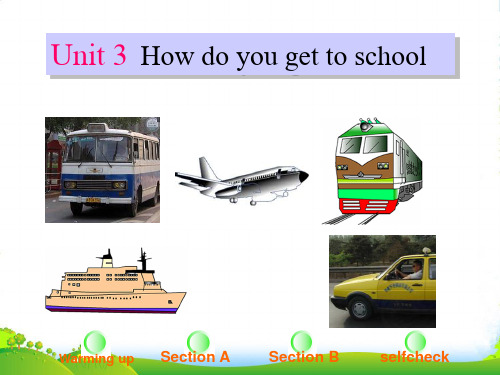
How do you get to school? I ______ to school.
ride one’s/a bike
walk
Say: I take (ride) the …to ...
hot balloon broom
Say: I take (ride) the …to ...
bird
Shanghai
I take。。。。
He takes。。。。
moon
How long does it take you to school? It takes me 10 minutes to get to school by bus.
10 minutes 25 minutes 8 minutes
Pair work
Make a conversation about how you get to school.
A: How do you get to school? B: Well, I usually walk but
sometimes I take the bus. A: How long does it take? B: It takes about 25 minutes to
get here
1b Listen and write the numbers next to the correct students in the picture above. 1. Bob 2. Mary 3. John 4. Paul 5. Yang Lan 6. Jim
2
6
4
5
3
1c Pair work
I take a walk after supper every day.
Unit3 SectionA 2d-3c课件 2022-2023学年人教版英语七年级下册

用两种方式翻译下列各句。 1. 吉姆每天步行去上学。
Jim w__a_lk__s _t_o_ _s_c_h_o_o_l every day. Jim g_o_e_s_ _to__s_ch__o_o_l _o_n_f_o_o_t_every day. 2. 我们通常乘公共汽车去市里。 We usually _t_a_k_e _th_e_ _b_u_s_ to the city. We usually go to the city _b_y_b_u_s_. 3. 露西骑自行车去公园。 Lucy _ri_d_e_s _h_e_r _b_ik_e_ to the park. Lucy goes to the park b_y__b_i_k_e_.
另外help 与out 之间还可以加具体的人, 如:Can ou help me out?
你能帮我一把吗? They helped (us) out with the clean-up. 他们帮助我们做大扫除。
2. at least 至少 e.g. We should brush our teeth at least twice a day.
3. school/your/from/it/is/how far/home/to __H_o_w__f_a_r_i_s_i_t_f_r_o_m__y_o_u_r_h_o_m__e_t_o_s_c_h_o_o_l_____? __I_t’_s_a_b_o_u_t__tw__o_k_i_lo_m__e_t_e_rs_.________________ 4. you/to/walk/do/school __D__o_y_o_u__w_a_l_k_t_o__sc_h_o_o_l___________________?
3. it takes sb. some time to do sth. 意为:_做__某__事__花__费__某__人__…__…__时__间______ 步行大约要花我15 分钟的时间。 _It__ta_k_e_s__m_e__a_b_o_u_t_1_5__m_i_n_u_t_es__to__w_a_l_k_._ 做作业大约花费简30分钟的时间。 _I_t _ta_k__es__J_a_n_e_a_b_o_u_t__3_0_m__in_u__te_s_t_o__d_o_h_er _h_o_m__e_w_o_r_k_._______________________
人教版七年级英语下册Unit 3 整单元课件(共102张PPT)

How do American students get to school?
How do American students get to school?
?
How do American students get to school?
for handicapped(残疾的) students
Girl: He takes the bus.
Boy: How do Paul and Yang Lan get to
school?
小贴士:
Girl: They walk. Look, there 注th意e模y仿a以re“how”
now.
开头的特殊疑问句 的语调。
Have a try !
Sally bike
What’s the
way of traveling?
Means of transportation in the future
More comfortable 更舒适 More convenient 更便捷 Better for the environment 更环保 Better use of the energy 更节能
Let’s travel: May Day is coming !
Survey(调查)
How do you get to your favorite place?
Names How do you get to… ? Reasons (why)
Mrs. Xu by train
comfortable(舒适的)
How does she get to school?
Does she …? Yes, she does./ No, she doesn’t.
人教版英语七年级下册Unit 3 同步知识精编讲义

人教版英语七年级下册U3 How do you get to school?同步知识精编讲义一、同步知识梳理一、词汇WordsSection A词汇1. One hundred and five 一百零五(P14)Hundred 数词,意为“百”,当前面有具体数字时,其后不加-s,不和of连用。
例:There are about eight hundred students in our school. 我们学校大约有80名学生。
【拓展】①若表示一个不确定的数字,前面没有具体数字时,其后要加-s,且与of连用。
hundreds of意为“数百的;成百上千的”There are hundreds of people in the restaurant. 这个餐馆里有数百人。
②与hundred用法类似的单词还有thousand“千”, million“百万”, billion“十亿”练习:(2014.山东东营)When he arrived at the airport, Lee Minho found that fans were waiting for him there.A. hundredB. hundredsC. hundred ofD. hundreds of解析:D hundred前有具体数字修饰时,表示确切数目,hundred前无具体数字修饰时,常用hundreds, 且与of 连用,此时表示概数。
“当李敏镐到达机场时,他发现数百粉丝正在那里等着他”。
2. I ride it to school every day. 我每天骑着它上学。
①ride此处作及物动词,意为“骑”,后面可接bike, horse, motorbike.等例:He rides a bike to school.= He goes to school by bike. 他骑自行车去学校。
② every 形容词,意为“每一,每个”,其后接单数可数名词,every day意为“每天”,是一般现在时的时间状语。
2016学年人教版七年级英语下册全单元教学课件Unit-3-How-do-you-get-to-schoolSection-A
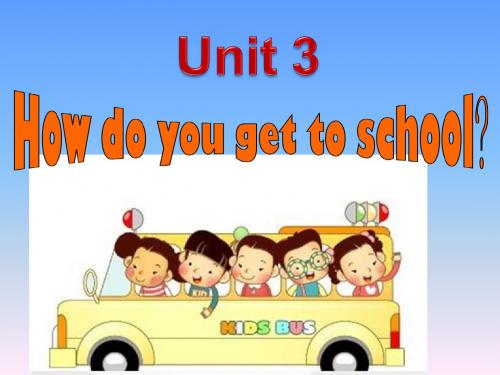
=I usually go to work _____ _____.
二.How far is it from your home to
school? __从__你_家__到_学__校__有_多__远_?_____________
12..h本o句w f中arit意指_多为代_远__的_距__是__离_________________,_用__于询问两
How far is it from your home to school? It’s only about two Dkioloems Jeatenres.walk to school? No, she doesn’t. She goes by bike.
It is about 20 kilometers.Sch来自ol 7:204:00
20 kilometers
Home 7:00
6:00
2b Listen and complete the
chart.
How
How long
How far
(minutes) (kilometers)
Tom walk
20
• Boy: Does Jim______ to school?
How does he/she get to school? He/she ….
ride the bike/bicycle walk
take the car
take the subway
take the train
take the ship take the plane
一、阅读Grammar Focus部分。
How do you get to school? I ride my bike. How does she get to school? She usually takes the bus. How long does it take to get to school? It takes about 15 minutes.
人教版英语七年级下册Unit 3 Section A GF-3c 课件
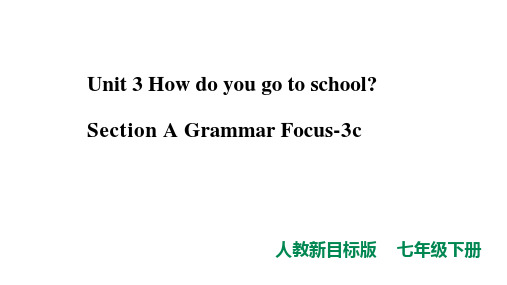
How does she get to school?
She usually takes the bus.
How long does it take to get to school? It takes about 15 minutes.
How far is it from your home to school? It’s only about two kilometers.
H从o你w 家far到is学it校fro有m多yo远ur?home to school? I它t’s只on有ly大ab约ou两t t公wo里k。ilometers.
DJaonees走Ja路ne去wa学lk校to吗sc?hool?
N不o,, s她he不do是es。n’t她. S骑he自go行es车by去b。ike.
Look and say
Look at the pictures, ask and answer questions with the help of the words and the pictures.
5 kilometers 40 minutes
A: How does Lily go to school? B: She goes to school on foot. A: How far is it from her home to school? B: It’s about 5 kilometers from her home to school. A: How long does it take? B: It takes her forty minutes to get to school.
Look and say
Look at the pictures, ask and answer questions with the help of the words and the pictures.
- 1、下载文档前请自行甄别文档内容的完整性,平台不提供额外的编辑、内容补充、找答案等附加服务。
- 2、"仅部分预览"的文档,不可在线预览部分如存在完整性等问题,可反馈申请退款(可完整预览的文档不适用该条件!)。
- 3、如文档侵犯您的权益,请联系客服反馈,我们会尽快为您处理(人工客服工作时间:9:00-18:30)。
14.一小时半 15.过桥 16.过河上学 17.乘索道 18.怕我 19.怕乘船 20.没有桥。
21.多远 22.离你家远 23.五十分钟 24.实现 25.做个梦 26.梦见他
14.one hour and a half(one and a half hours) 15.cross the bridge 16.cross the river to school 17.go on a ropeway 18.be afraid of me 19.be afraid to take a boat 20.There is no bridge.(There isn't a bridge)
5.四个“花费”的区别
• Sb.Spend time/money on sth./(in)doing sth. 某人花钱或时间在某事上,或做某事 • Sb. Pay money for sth. • 某人花钱买某物 • Sth. Cost sb. Money 某物花某人多少钱 • It takes sb. Time to do sth. • 做某事花费某人多长时间
walk
ride my bike
I take the bus
to school.
take the subway
take the train
on foot.
I get to school
by bike/on my bike. by bus/on the bus. by subway/in the subway.
Learn and tell the differences and the same.
20 twenty
12
30 thirty
13
40 forty
14
50 fifty
15
60 sixty
16
70 seventy
17
80 eighty
18
90 ninety
19
100 one hundred
2 (two) 3 (three) 4 (four) 5 (five) 6 (six) 7 (seven) 8 (eiLeabharlann ht) 9 (nine)练习二
1.乘地铁 2.骑自行车 3.一百零八 4.九百九十九 5.动身去北京 6.乘索道过河 7.开车回家 8.开车去武汉 9.捎她去武汉 10.住在村里 11.公汽停靠点 12.停下来读 13.停止读
1.take the subway(the subway ride) 2.ride a bike(by bike,on a bike) 3.one hundred and eight 4.nine hundred and ninety-nine 5. leave for Beijing 6.cross the river on a ropeway 7.drive home 8.drive a car to Wuhan 9.drive her to Wuhan 10.live in a village 11.a bus stop 12.stop to read 13.stop reading
27.live 2 kilometers from school 28.dream her to take the train 29.drive his car to work 30.15 minutes by bike 31.take me half an hour to read 32.leave Zaoyang for Beijing 33.leave my book at home 34.need an hour to get to school 35.between me and him 36.an 11-year-old boy
thirty forty fifty sixty seventy eighty ninety
1.ride 旅程;旅行 bus ride 汽车旅程 train ride 火车旅程 subway ride 地铁旅程 My bus ride is very boring. 我的公共汽车旅程很无聊。 The train ride takes us five hours. 火车旅程花费了我们五个小时。 2. It’s good exercise. Exercise在这里是个名词,一般是不可数名词 如:take much exercise 但是 do morning exercises do eye exercises这两个词组时是可数名词 当动词表示锻炼,exercise=do sports= play sports
• 3. how long 用来提问时间,意为多久,回 答常用“for+段时”。
A: How long does it take him to get from home to school ?
B: It takes him twenty minutes.
• ----How long have you learnt English? • ----For 3 years.
练习一 根据句意及首字母和汉语提示填写单词。
1. Jim’s grandparents ___li_v_e___ (居住)in Hangzhou. 2. There is a river _b_e_t_w_e_e_n_ (介于……之间)my home and his home. 3. You can see __m__a_n_y__ (许多)books on his desk. 4. The _b_r_id_g_e___ (桥)is old and it has a long history. 5. I usually__r_id__e_ (骑) my bike to go shopping.
by train/on the train.
• 2. how far 用来提问距离,多远, How far is it from A to B?=How far is B from A?
• 其答语分为两种: • (1)用长度单位表示:
It’s…meters/miles/kilometers(away) • 有……米/英里/千米(远) • (2)用时间表示: • It ‘s about ten minutes’ walk/ ride. • 大约有十分钟步行/骑车的路程。
选词填空 根据短文内容,从方框中选择合适的单词,并用 其适当形式填空。
for, bike, by, ride, kilometer, live, need, drive, hundred, take
(二)基数词
1 one 2 two 3 three 4 four 5 five 6 six 7 seven 8 eight 9 nine 10 ten
11 eleven 12 twelve 13 thirteen 14 fourteen 15 fifteen 16 sixteen 17 seventeen 18 eighteen 19 nineteen 20 twenty
语法归纳
• (一)how 引导的特殊疑问句 • 1.how 引导的特殊疑问句提问交通方式,其答
语分三种情况: • a. take a/an/the+交通工具(单数) • b. by+交通工具(单数) • c. on/in+限定词+交通工具
A: How do you get to school?
B:
Do they take the bus to school?
She usually takes the bus.
It takes about 15 minutes.
It’s only about two kilometers. No, she doesn’t. She goes by bike. No, they don’t. they walk.
1.How about taking (take) a train for a travel? 2.It took me half an hourto read(read) English yesterday. 3.Five hours is (be) a very long time. 4.Excuse me, could you tell me how to get(get) to the park. 5.In the picture you can see four old ___b_u_s_es__ (bus).
4 sixty-two
and fifty-eight
9 seventy-four 200 two hundred
5 eighty-eight 345three hundred and
5 ninety-nine
forty-five
Can you find the differences
thirteen fourteen fifteen sixteen seventeen eighteen nineteen
6.三个“到达”的区别
• get表示“到达”,后接名词需加to,接地 点副词(home,here,there等)不加to.
• reach 给示到达,是及物动词,其后直接接 宾语。
• arrive in+大地点 arrive at +小地点, 后接 副词不需介词。
练习三 用所给单词的适当形式填空。
3. It takes + 人 + 时间 + to do … (事情)做某事花
费某人多长时间。
如:It usually takes me five to ten minutes to get there by bus.
乘坐公交车去那儿我通常要花五到十分钟的时间。
It takes me ten minutes to finish my English homework. 4. It’s ten minutes’ walk from my home to school. 从我的家到学校步行要10分钟.
